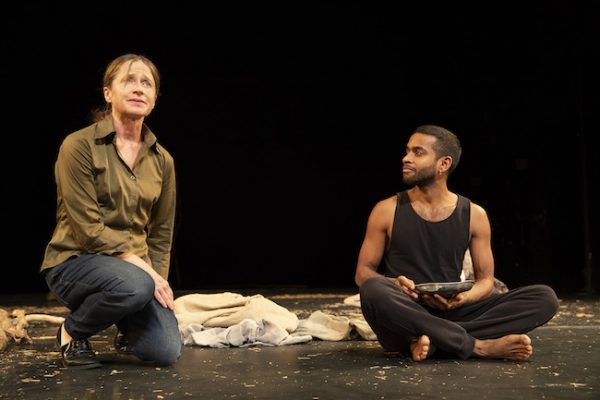Theater Review: “The Prisoner” — A Parable, Incomplete
Peter Brook has decided to be more than a little stubbornly anti-theatrical in The Prisoner.
The Prisoner, text and stage direction by Peter Brook and Marie-Hélène Estienne. Presented by Yale Repertory Theatre at Yale Repertory Theatre, 1120 Chapel Street, New Haven, CT, through November 17.

Hayley Carmichael and Hiran Abeysekera in the American premiere of “The Prisoner.” Photo: Joan Marcus.
By Bill Marx
An afternoon of ecstasy and shame. The thrill? The talkback after Saturday’s matinee of the American premiere at the Yale Repertory Theatre of Peter Brook and Marie-Hélène Estienne’s latest theater piece, The Prisoner. At least I was agog: there, along with the production’s cast members and Estienne, sat the legendary Peter Brook himself, the director of a revolutionary staging of A Midsummer Night’s Dream (back in the early ’70s) as well as other acclaimed productions. He was resplendent in a bright orange sweater, still damned sharp at the age of 93.
I have missed Brook’s Shakespeare productions (though I am a fan of his Beckett-infused film version of his staging of King Lear featuring Paul Scofield and Irene Worth), but at BAM I saw his glorious epic The Mahabharata and marvelous The Cherry Orchard. I have read a number of his influential books, including The Empty Space and The Open Door: Thoughts on Acting and Theatre. Brook is among our greatest living directors: his honors include Tony and Emmy Awards, a Laurence Olivier Award, the Premium Imperiale, and the Prix Italia.
So what was embarrassing? This extraordinary artist is in New England and he has received no coverage from Boston’s major ‘arts coverage’ outlets: a Google check of The Boston Globe, WBUR’s Artery, and WGBH reveals absolutely nothing on Brook and this production — an American premiere! (I checked with the Yale Rep publicist; I am the only critic from Boston to come to see the show!) Years ago The Boston Globe would have at least previewed this production — probably reviewed it. The Boston Phoenix would have sent someone down to New Haven. (I would have run.) Nada now.
This neatly illustrates the hollowing out of serious arts coverage that has gone on over the past decade or so in the Boston area. The ExtraOrdinary has been defined (down) for blithely compliant media players by ace entrepreneur Diane Paulus and the now Broadway-branded American Repertory Theater. In terms of arts coverage, what’s left of it in the mainstream media is increasingly becoming more about writers hitching a cushy ride on the commercial bandwagon than them getting off their butts to seek out, and argue for, the real thing. It is sad, shameful — and telling.
Scolding administered, let’s look at The Prisoner. I would love to say that this short piece (around 70 minutes) bowled me over, but it seems that on this occasion Brook has honed his elegant minimalism to the point of diminutive returns. The text deals with an elemental dilemma: how do you expiate an ‘unspeakable’ crime, in this case involving incest and patricide. But the action is self-consciously undernourished: it feels like an unfinished parable, or a haiku obsessed with its own nebulousness. The idea is that the audience’s imagination will supply the missing links, and that is laudable in an age when scripts (often penned by wanna-be screenwriters) spell out everything for the sake of surefire consumer satisfaction. But, while The Prisoner supplies moving moments, there just isn’t enough drama or poetry here to stimulate the mind.
The Prisoner is set in a mysterious foreign country. Masuvo (Hiran Abeysekera) is being punished for committing a primal crime, with the twist that his uncle manages to have the young man serve his sentence outside of a rural prison. He spends his days and nights in the open air, struggling to survive. Ironically, Masuvo is being punished more severely than the conventional prisoners — he isn’t guaranteed meals, companionship, or a roof over his head. He often stares at the audience, with the stimulating suggestion that we are in the prison. (Captured by Facebook? Incarcerated by middle class comfort?) Events happen (two of the prison’s guards drop by with a bottle of booze and a few punch lines, a villager who has a knack with an ax makes threatening noises, and there is a strange encounter with a rat) but they don’t generate much of a sense that Masuvo is on a journey toward self-healing. A framing device, in which a storyteller (Hayley Carmichael) is charged with searching out Masuvo, is equally underdeveloped.
Brook has decided to be more than a little stubbornly anti-theatrical here. The set has a gaunt elegance — it is bare, aside from a tree stump, debris, and some bits of ground. There is no music, and the plot doesn’t conclude so much as vaporize. The Prisoner‘s stoic characters end up being much too successful at repressing their passions and inner transformations. This said, the international cast moves with graceful fluidity and their voices are wonderfully rich. The pace of the show is deliberately slow, so we are forced to scrutinize the performers’ faces and the expressive movements of their bodies. And this physicality generates considerable power. Dissing our ‘cut-to-the-chase’ culture, Brook sedates time — and in the hands of a great theater artist that presents invaluable possibilities. But The Prisoner doesn’t take sufficient advantage of its freedom.
Bill Marx is the editor-in-chief of The Arts Fuse. For over three decades, he has written about arts and culture for print, broadcast, and online. He has regularly reviewed theater for National Public Radio Station WBUR and The Boston Globe. He created and edited WBUR Online Arts, a cultural webzine that in 2004 won an Online Journalism Award for Specialty Journalism. In 2007 he created The Arts Fuse, an online magazine dedicated to covering arts and culture in Boston and throughout New England.

I agree Peter Brook is wonderful. I’m glad he’s still working.